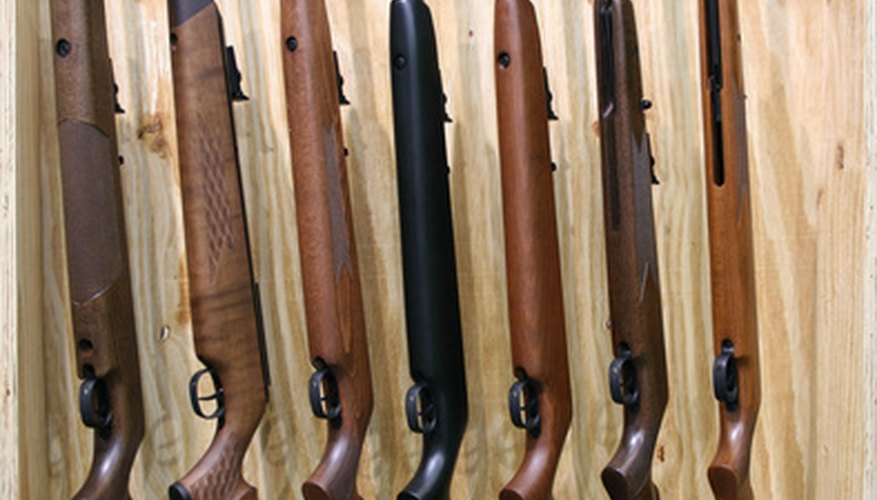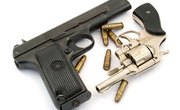
The simplest way to research a gun's history is have the police run a check through the Bureau of Alcohol, Tobacco, Firearms and Explosives' database. This will tell you whether the gun has been reported stolen or used in a crime. There are also websites where responsible gun owners can upload information about suspicious firearms, and you can access these databases for free online.
Find the Serial Number
Every gun has a serial number – a series of numbers or a combination of numbers and letters imprinted on the body of the gun. Most manufacturers stamp the serial number into the metal of the trigger guard, handle, slide or receiver so that it won't wear off easily. If you bought the gun from a licensed firearms dealer, you can also call them and ask for the serial number. If there's no serial number and the gun isn't an antique, take the gun to the police. A scratched-off or sanded-away serial number suggests an illegal gun.
Visit Your Local Police Department
Give the serial number to the local police department and ask them to run a firearm trace. Police and sheriff departments have access to the national ATF eTrace database, which indicates whether the gun has been reported lost, stolen or used in a crime. If there's an alert in the system, the police might investigate further – for example, by contacting the manufacturer and dealer and finding out who they sold the gun to. Be prepared to turn over the weapon if the eTrace system throws up a flag.
Check Police Records Online
Some police departments, for example the Florida Crime Information Center, provide public-access firearms information that you can search online by inputting the gun's serial number. There's limited information about the gun's history, but you should be able to find out whether a firearm has been reported stolen. Search the law enforcement website of the state where you purchased the gun to see if it offers an online service.
Check Third-Party Websites
Websites such as HotGunz publish databases of firearms that owners report after they realize a gun has been stolen. These sites are not tied to any law enforcement agency and aren't a substitute for an official police trace, but they are quick to use and can provide some valuable information. Simply input the gun's serial number into the search field to see if your weapon is listed.
A Note About Vintage Guns
Vintage and antique guns may not have the serial number printed on the gun's body, because they were manufactured before the legal requirement to do so. To identify the make and model of these guns, dig around the manufacturer's website. Alternatively, take the firearm to a gun dealer who specializes in antique and collectible guns. He or she should be able to research the gun's history and provide the make, model, date of manufacture and original owner specifications, for a fee.
References
Writer Bio
Jayne Thompson earned an LLB in Law and Business Administration from the University of Birmingham and an LLM in International Law from the University of East London. She practiced in various “big law” firms before launching a career as a commercial writer. Her work has appeared on numerous legal blogs including Quittance, Upcounsel and Medical Negligence Experts. Find her at www.whiterosecopywriting.com.


